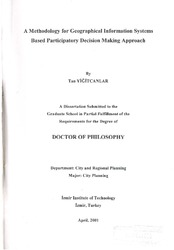Please use this identifier to cite or link to this item:
https://hdl.handle.net/11147/2885| Title: | A Methodology for Geographical Information Systems Based Participatory Decision Making Approach | Authors: | Yiğitcanlar, Tan | Advisors: | Arkon, Cemal | Publisher: | Izmir Institute of Technology | Abstract: | Geographical Information Systems (GIS) to come up with better planning can be utilized. But unless the final decisions contain strategic and participatory decisions and are indeed an improvement upon previous solutions and are in fact turned into actions, using a GIS will just not necessarily increase the cost of the planning activities. In this thesis a new approach, which is called "Geographical Information Systems Based Participatory Decision Making Approach (GISbPDM)" is proposed to overcome current planning problems and also to answer most of the debates about traditional GIS. GISbPDM employs three basic components in its body. Collaborative GIS is the first component of GISbPDM and represents the spatial decision support system and makes new GIS trends available - especially Public Participation GIS - for public, urban planners and decision makers. Strategic Choice Approach is the second component of GISbPDM and it is a sophisticated technique for making decisions and developing action plans in situations with many options and uncertainties in a participatory manner.Computer Supported Collaborative Work System (CSCW) is the third component of GISbPDM and has an involving structure - by cooperative work and participatory design supported by computers - for utilization of the collaborative and participatory decision models. The system architecture of GISbPDM has quite a simple mechanism. GIS including the local and central databases is used for data manipulation, visualization, queries and interactive sketching on an easily accessible platform. Strategic Choice Approach is the policy and decision-making model that works interconnected to this GIS platform.Accordingly participants can visualize the alternatives, submit them to the decisionmakers and other participants, allow them to modify the alternatives and create their own proposals. The participation can be realized in different levels such as information participation, collaborative work, public participation and elite participation. Proposed system architecture has an encouraging power for participatory planning and besides CSCW helps in increasing participation in all levels. | Description: | Thesis (Doctoral)--Izmir Institute of Technology, City and Regional Planning, Izmir, 2001 Includes bibliographical references (leaves: 208-232) Text in English; Abstract: Turkish and English 269 leaves |
URI: | http://hdl.handle.net/11147/2885 |
| Appears in Collections: | Phd Degree / Doktora |
Files in This Item:
| File | Description | Size | Format | |
|---|---|---|---|---|
| T000116.pdf | DoctoralThesis | 130.08 MB | Adobe PDF |  View/Open |
CORE Recommender
Page view(s)
344
checked on Jun 10, 2025
Download(s)
120
checked on Jun 10, 2025
Google ScholarTM
Check
Items in GCRIS Repository are protected by copyright, with all rights reserved, unless otherwise indicated.